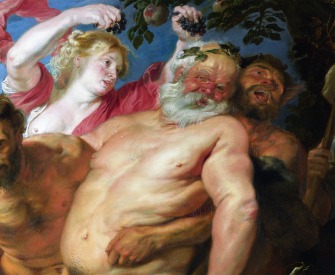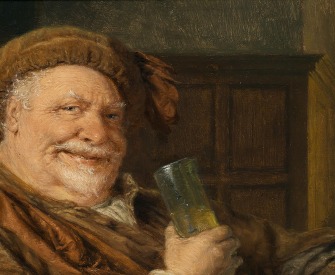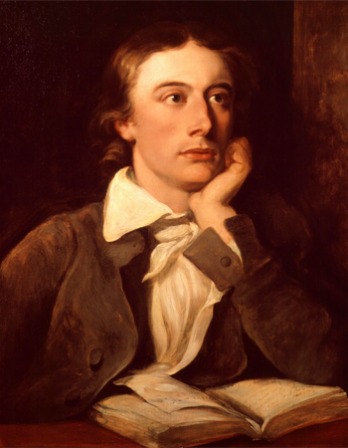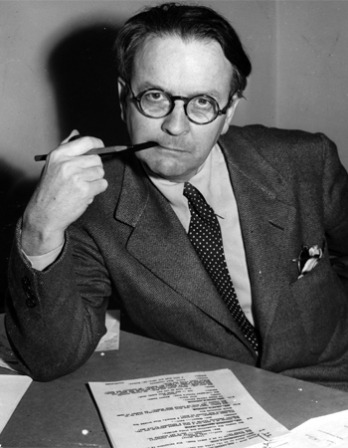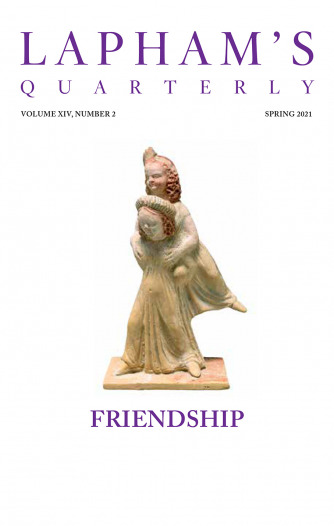Write while the heat is in you. The writer who postpones the recording of his thoughts uses an iron which has cooled to burn a hole with. He cannot inflame the minds of his audience.
—Henry David Thoreau, 1852Gustave Flaubert Conducts a Workshop
Playwriting for dummies.
Bouvard and Pécuchet decided to write a play of their own.
The difficult part was finding a subject.
They tossed around ideas while having lunch, followed by coffee, an indispensable liquor for the brain, then by a digestif or two. Then they lay down on their beds to take a nap. After that, they strolled around the orchard, went out to find inspiration, took long walks side by side, and returned home exhausted.
Or else they shut themselves indoors. Bouvard cleared off the table, set some blank paper in front of him, dipped his quill in the inkwell, and sat with his eyes glued to the ceiling; Pécuchet meditated in his armchair, legs stretched out and head lowered.
Sometimes they felt a shiver, like the breath of an idea. Before they could capture it, it had vanished.
But there are ways of finding subjects. You pick a title at random, and a story flows from it. You develop a proverb, or combine several adventures into one. None of these methods bore fruit. They skimmed through books of anecdotes, volumes of famous court cases, a stack of histories, all in vain.
And they dreamed of being performed at the Odéon, imagined the spectacle, missed Paris.
“I was meant to be an author, not to bury myself in the country!” said Bouvard.
“Same goes for me,” answered Pécuchet.
An inspiration struck him: if they were having such trouble, it was because they didn’t know the rules.
They studied The Practice of Theater by d’Aubignac, plus a few works that weren’t so outdated.
The key questions were discussed. Can comedy be written in verse? Does tragedy cross the line when it takes its subject from modern history? Must the hero be virtuous? What kinds of villains should it contain? At what point do horrors become excessive? The details should all point toward a single end; the interest of the plot should increase; the ending should correspond to the beginning—of course!
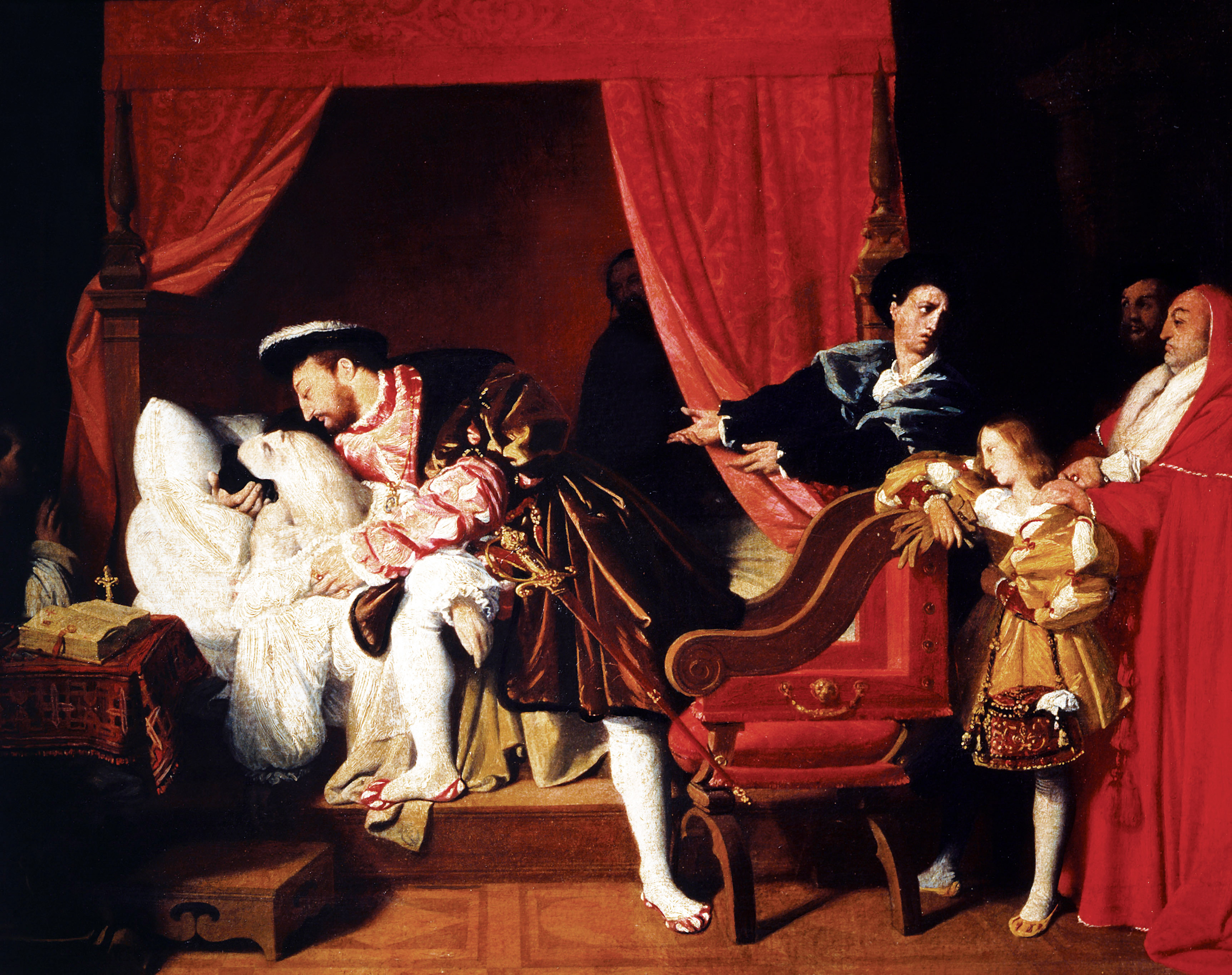
The Death of Leonardo da Vinci, by Jean-Auguste-Dominique Ingres, 1818. Petit Palais, Paris, France.
“Show us a new wonder in each line,” says Boileau.
How does one show a new wonder? “In all you write, observe with care and art / To move the passions, and incline the heart.”
How do you go about inclining the heart?
So rules were not enough—you needed genius as well.
And even genius wasn’t enough. Corneille, if you listened to the French Academy, had no understanding of theater. Geoffroy disparaged Voltaire. Racine was mocked by Subligny. La Harpe roared at the very mention of Shakespeare.
Disgusted by the classical critics, they gave the more recent ones a try, and read through theater reviews from the newspapers. What cheek! What thickheadedness! What a lack of integrity! Insults were heaped upon masterpieces, reverences made to platitudes—and the inanities of those who passed for wise, and the stupidity of others who were considered witty!
Perhaps they should trust in popular opinion instead? But often they didn’t like the applauded works, while something about the booed ones appealed to them.
Thus, the opinion of professionals was misleading and the judgment of the crowd was not to be believed.
Bouvard posed the dilemma to his friend Barberou. Pécuchet, for his part, wrote to his friend, Professor Dumouchel.
Barberou was astounded by how much the provinces had softened their brains. Old Bouvard was turning into a dope—in short, he “wasn’t getting it.” Theater was a consumer product like any other. You go to a show to enjoy yourself. Good means entertaining.
“You nitwit!” cried Pécuchet. “What entertains you might not entertain me—and everyone, even you, will get tired of it sooner or later. If plays are necessarily written to be performed, how come the best ones are always read?” And he awaited Dumouchel’s reply.
According to the professor, a play’s immediate reception proved nothing. The Misanthrope and Athalie were flops in their day. Zaire is no longer understood. Who today still talks about Ducange and Picard? And he recalled all the great successes of their time, from Fanchon the Organ Grinder to Gaspardo the Fisherman, deploring the decadence of today’s stage. This was due to a disregard for literature—or rather, for style.
So they wondered what style consisted of, precisely. And thanks to the authors Dumouchel had suggested, they learned the secrets of all the genres, how one conveys a majestic, temperate, or naive tone, noble turns of phrase, vulgar language. Dogs can be elevated by devouring. Vomit is used only in the figurative sense. Fever is applied to passions. Valor works well in rhyme.
“What if we wrote in verse?” said Pécuchet.
“Later! Let’s deal with prose first.”
It is strictly recommended that a classical piece be chosen as a model. But each one has its drawbacks—and all of them have committed offenses not only against style, but also against language.
Such an assertion perturbed Bouvard and Pécuchet, and they began studying grammar.
Does our idiom contain definite and indefinite articles, as in Latin? Some say yes, others no. They didn’t dare decide.
The verb must always agree with the subject, except in instances when the verb does not agree.
Should one say “that group of women looks good” or “look good”? A gang of thieves “rush forward” or “rushes forward”?
The grammarians themselves disagreed, some finding beauty where others saw errors. They admitted principles but ignored the consequences, proclaimed consequences but refused the principles, leaned on tradition but rejected the masters, and came up with bizarre refinements.
They concluded that syntax was a fantasy and grammar an illusion.
Perhaps the science called aesthetics could help them. A friend of Dumouchel, a philosophy professor, sent them a list of works on the subject. They worked separately, communicating their reflections to each other.
First of all, what is beauty?
For Schelling, it is the infinite expressed by the finite; for Reid, an occult quality; for Jouffroy, an integral fact; for de Maistre, something that pleases virtue; for Father André, what suits reason.
And there exist several types of beauty. Beauty in science: geometry is beautiful. Beauty in mores: no one can deny that the death of Socrates was beautiful. Beauty in the animal kingdom: the beauty of the dog resides in its sense of smell. A pig cannot be beautiful, given its squalid habits; nor a serpent, for it evokes thoughts of baseness. Flowers, butterflies, and birds can be beautiful. Finally, the primary condition of beauty is unity in variety—that’s the principle.
“Still,” said Bouvard, “two crossed eyes are more varied than two straight ones but don’t produce as good an effect—generally speaking.”
They broached the question of the sublime.
Certain objects are sublime in and of themselves: the roar of a torrent, deep shadows, a tree felled by the tempest. A protagonist is beautiful when he triumphs, sublime when he struggles.
“I understand,” said Bouvard. “The beautiful is beautiful, and the sublime is very beautiful. How can we tell them apart?”
“By means of tact,” answered Pécuchet.
“And where does tact come from?”
“From taste!”
“What is taste?”
It is defined as a particular discernment, rapid judgment, the ability to distinguish certain relations.
“So in the end, taste is taste—and none of that tells us how to have it.”
Translated by Mark Polizzotti. © 2005 by Mark Polizzotti. Used with permission of Dalkey Archive Press.

Gustave Flaubert
From Bouvard and Pécuchet. Sent to study law in Paris at the age of nineteen, Flaubert became distracted by “the bitter poetry of prostitution,” contracting a venereal disease from which he never fully recovered. In his works of fiction he sought to imitate God by being “present everywhere and visible nowhere.” The publication of Madame Bovary in 1856 resulted in his being brought to trial on the charge of contributing to public depravity.
